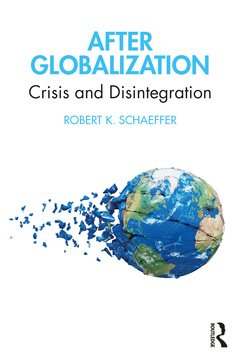After Globalization Crisis and Disintegration
Auteur : Schaeffer Robert K.

In the 1980s, U.S. officials adopted tax and monetary policies that channeled huge new resources into Wall Street, which fueled a stock market boom. To increase profits and payouts to investors as stock prices soared, corporate managers consolidated businesses, outsourced manufacturing to low-wage countries, and adopted new technologies to increase productivity. Government officials then facilitated mergers and negotiated free trade agreements to speed the process of globalization. Wall Street became an engine of capital accumulation and a force for global change.
These developments resulted in massive job losses and stagnant wages for most Americans. Meanwhile, tax cuts and the stock market boom created vast new wealth for the rich, and the top 10 percent seized 50 percent of all income in the United States. The result was growing economic inequality.
During the decades that followed, globalization triggered regional economic crises, toppled governments, transformed societies, galvanized economic development in China, and created new forms of wealth and inequality around the world. Then in 2008, a financial crisis rooted in Wall Street triggered the Great Recession, wrecked the legitimacy of globalization as a development strategy, and unleashed populist or "restrictionist" social movements and political parties that challenged globalization and attacked its economic and political foundations.
This book examines the origins of globalization in the 1980s, the developments that triggered the Great Recession, and the political and economic forces that contributed to the disintegration of globalization as a force for change in the modern world. After Globalization explains what happened?and what comes next.
1. The Crisis of U.S. Hegemony and the Battle Against Inflation
2. Jumpstarting Wall Street
3. Wall Street and Stock-Price Inflation
4. Mergers and Downsizing
5. De-Unionization, Outsourcing, and De-Industrialization
6. Technology and Job Loss
7. Economic Inequalities
8. Globalization and Crises
9. Globalization and China
10. Housing and the Great Recession
11. The Economic Costs of the Great Recession
12. The Political Consequences of the Crisis
13. Uncoupling and De-Globalization
14. Marginalization and Disintegration
15. Covid and the Greater Recession
Robert K. Schaeffer is Professor Emeritus of Sociology at California Polytechnic State University in San Luis Obispo, and Professor Emeritus of Sociology at Kansas State University. He is the author of Warpaths: The Politics of Partition (1990); War in the World- System (1990); Power to the People: Democratization Around the World (1997); Understanding Globalization: The Social Consequences of Political, Economic, and Environmental Change (1997; 2001; 2005; 2009; 2016); Severed States: Dilemmas of Democracy in a Divided World (1999); Red Inc.: Dictatorship and the Development of Capitalism in China, 1949 to the Present (2012); Social Movements and Global Social Change: The Rising Tide (2014); and with Torry Dickinson, Fast Forward: Work, Gender and Protest in a Changing World (2001); and Transformations: Feminist Pathways to Global Change (2008).
Date de parution : 09-2021
15.2x22.9 cm
Date de parution : 09-2021
15.2x22.9 cm
Mots-clés :
Federal Reserve; Low Level Equilibrium Traps; Fed Raised Interest Rates; West Germany; Occupy Wall Street; United States; Big Tech; High Interest Rate Policies; Home Loans; Smart Phones; Trump Administration; Chinese Government; Shadow Banks; Public Infrastructures; Junk Bonds; Tea Party Activists; Anti-trust Laws; Antitrust Law; Global Public Health Crisis; Outsource Production; College Wage Premium; Rising Stock Prices; Oil Price Inflation; ARRA; Predatory Pricing



